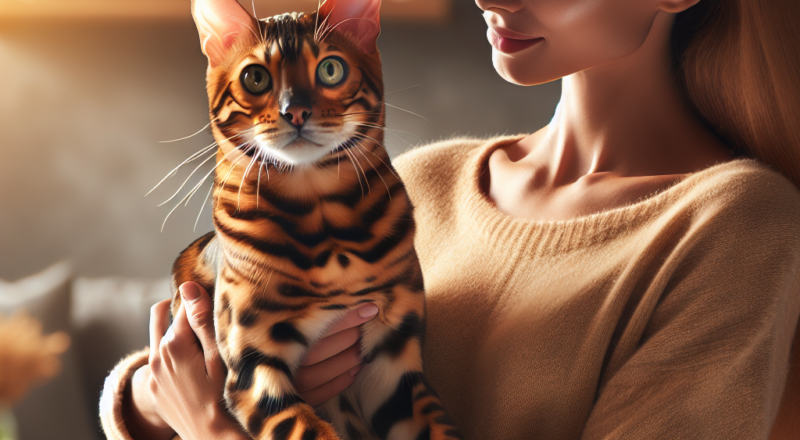The Bengal cat is a unique and captivating breed known for its striking appearance and playful nature. Originating from hybrids of the domestic cat and the Asian leopard cat, Bengals are renowned for their wild look and high energy levels.
Key Characteristics of Bengal Cats
| Feature | Description |
|---|---|
| Appearance | Beautiful, sleek coat with distinctive spots or marbling, resembling a wild leopard. |
| Size | Medium to large, muscular body. |
| Personality | Affectionate, energetic, and social. Known for their high intelligence. |
Health and Care
Bengal cats are generally healthy but can be prone to certain genetic conditions. Regular vet check-ups ensure they stay in peak condition. Vaccinations are crucial, especially early on in life.
Key Health Tips:
- Regular vet visits for check-ups and vaccinations.
- Monitor for any signs of health issues like Progressive Retinal Atrophy (PRA) or heart conditions.
Diet and Nutrition
Feeding your Bengal a healthy diet, rich in protein, is vital. Bengals are active cats, and their diet should support their energetic lifestyle.
Discover the secrets to a balanced diet for your pet with our curated list of recipes designed to cater specifically to the nutritional needs of active cats.
Behavior and Training
Bengals are known for their playful behavior and love of climbing, making vertical spaces and interactive toys essential. They are highly trainable and can often be taught fetch and other games typically associated with dogs.
Social Interaction
Bengals thrive on social interactions, both with humans and other animals. They generally enjoy the company of children and can form strong bonds with family members.
Adopting a Bengal Cat
When considering adoption, always look for reputable breeders or shelters. Adoption not only saves a life but also brings immense joy to your household.
Costs Involved
While Bengals can be a bit pricier due to their unique pedigree, they are worth the investment. Consider ongoing costs like quality food, regular vet visits, and pet insurance.
Know Your Rights as a Pet Owner
Understanding the legal aspects of pet ownership can prevent future misunderstandings. Familiarize yourself with local laws regarding pet care and ensure that the Bengal you choose is legally bred and sold.
Saiba mais
To ensure you have all the information you need, here are 20 key facts about Bengal cats:
- Bengal cats are derived from breeding domestic cats with Asian leopard cats.
- They require a lot of attention and stimulation.
- Bengals love interactive play and mental challenges.
- They enjoy climbing, so tall scratching posts are ideal.
- A poor diet can lead to obesity in Bengals.
- They can be trained to walk on a leash.
- Socialization is crucial from a young age.
- Bengals can adapt to other pets if introduced properly.
- They have a lifespan of 12-16 years.
- Regular grooming is necessary despite their short coat.
- They can form strong bonds with their human family.
- Their coat patterns include spotted, marbled, and rosetted.
- Bengals are susceptible to allergies.
- They are known for their vocal nature.
- Bengals enjoy water and may join you for a splash.
- Ensure you have enough space for them to explore and play.
- Feeding them a raw diet can be beneficial.
- They should be given regular dental care.
- Bengals can be escape artists; ensure your home is secure.
- Consider pet insurance to cover unexpected health costs.
Discover the secrets for a healthy diet for your pet with over 40 delicious and nutritious recipes
All About Bengal Cats: A Comprehensive Guide
Bengal cats are one of the most fascinating pet breeds known for their striking appearance and vibrant personalities. Originating from a mix of domestic cats and Asian leopard cats, Bengal cats have captured the hearts of many pet lovers. With their unique spotted coats and playful demeanor, they are an ideal choice for feline enthusiasts looking for an engaging and interactive companion.
History of the Bengal Cat
The Bengal cat was developed in the 1970s by breeding domestic cats with the Asian leopard cat. This was done to create a domestic cat that has the exotic beauty of a wild cat while maintaining the friendly temperament of a pet. The breed was officially recognized in the 1980s, and since then, they have gained immense popularity across the globe.
Notable Owners
One of the most famous personalities known to own a Bengal cat is the late pop icon, Michael Jackson. He was noted to have had a fondness for exotic pets, including Bengal cats, which emphasized his unique and artistic lifestyle.
Bengal Cats Around the World
| Country | Popularity |
|---|---|
| United States | High |
| United Kingdom | Moderate |
| Canada | Moderate |
| Australia | High |
| France | Low |
Selecting Your Pet
When choosing a pet, it is crucial to consider factors such as lifestyle, space, and time commitment. Bengal cats require ample space to roam and play, so they are best suited for active individuals or families with room for them to express their energy.
Importance of Adoption
While purchasing a Bengal cat from a breeder is an option, consider adopting from shelters or rescues to give a deserving cat a loving home. The adoption process often involves an application and screening to ensure the cat finds an ideal match.
First Care Upon Arrival
Preparing your home for a Bengal cat involves creating a safe and stimulating environment. Ensure you have all the necessary supplies, including a litter box, cat food, water dishes, scratching posts, and cozy resting areas.
Proper Nutrition
Feeding your Bengal cat a balanced diet is essential. Consult with your veterinarian for recommendations on high-quality cat food, determining feeding quantities and schedules tailored to your cat’s age, weight, and activity level.
Hydration
Fresh and clean water should always be available for your Bengal cat. Hydration is crucial for their overall health and helps prevent urinary problems.
Vaccination and Deworming
Establish a vaccination schedule with your veterinarian, as regular vaccinations protect against common diseases. Deworming is also essential to maintain your cat’s health.
Regular Veterinary Check-ups
Scheduling annual or semi-annual veterinary visits is vital for early detection and prevention of health issues.
Grooming
Bengal cats have a short, dense coat that requires regular grooming. Regular brushing helps reduce shedding and keeps their coat healthy. Additionally, take care of their claws, teeth, and ears.
Physical Exercise
Bengal cats are active and playful; therefore, regular exercise is necessary for their physical and mental well-being. Provide opportunities for playtime, such as interactive toys and climbing structures.
Playtime and Environmental Enrichment
Engaging your Bengal cat in play and providing enriching environments helps stimulate their minds. Rotation of toys and introducing new activities can keep them entertained.
Socialization
Socializing your Bengal cat from an early age is essential. Exposing them to different people and environments can help them develop into well-adjusted pets.
Basic Training
Training your Bengal cat in basic commands can promote safety and improve the bond between you and your pet.
Addressing Problem Behaviors
Understanding and addressing any behavioral issues such as aggression or separation anxiety is vital for a harmonious living environment.
Identification
Ensure your Bengal cat has a proper collar with an ID tag and consider microchipping for added safety if they should wander.
Home Safety
Taking precautions to prevent household accidents is essential, ensuring that potential hazards are out of reach.
Legal Responsibilities
Be informed about local laws regarding pet ownership, including requirements for identification and welfare.
Financial Considerations
Owning a Bengal cat includes budgeting for food, veterinary care, grooming supplies, and toys. Determine a financial plan to maintain your furry friend’s well-being.
Emotional Impact
Bengal cats are known for their affectionate nature, which can positively contribute to mental and emotional well-being, providing companionship and joy.
Aging Care
As Bengal cats age, they may require special care and considerations to ensure comfort and quality of life.
Dealing with Loss
The bond with your Bengal cat is profound; learning to cope with the loss of a cherished pet is a journey that requires support and understanding.
Transform Your Dog’s Behavior in Just Days!
If you’re struggling with your pet’s behavior, consider our program. It’s a practical and valuable solution! Click the image below to learn more:



/hotmart/checkout_custom/10424f92-b07f-4561-bff4-bf470c0e4846/6t29rz3e.jpg)